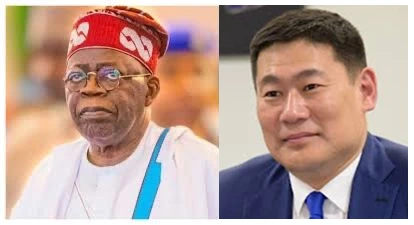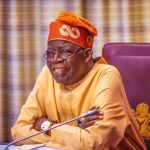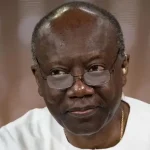
Tinubu’s Silence on Son’s Use of Presidential Jet Draws Contrast with Mongolian PM’s Resignation

President Bola Tinubu has been criticised over the apparent misuse of state resources following an incident where his son, Seyi Tinubu, was seen flying a presidential jet to attend a polo tournament in Kano a private event with no official government function.
Despite the event occurring months ago, the controversy has reignited following renewed criticism on social media and growing public frustration over extravagant spending by Nigeria’s ruling class, especially as the country faces economic hardship, rising inflation, and calls for fiscal restraint.
Nigerians have taken to various platforms to condemn the perceived abuse of public assets, pointing out the contrast between Nigeria’s leadership and that of Mongolia, where Prime Minister Luvsannamsrain Oyun-Erdene recently resigned after his son used a state vehicle for personal use.
In Mongolia, the use of a single government car for unofficial reasons sparked enough public pressure to compel a high-ranking resignation. In Nigeria, however, a presidential jet far more symbolic and expensive to run and maintain was used without consequence, highlighting what many see as a double standard and culture of impunity.
Critics argue that President Tinubu’s administration, which has consistently pledged to reduce government waste and promote accountability, has fallen short of these promises. The ₦55 billion allocated for presidential fleet maintenance and ₦7.65 billion for new State House vehicles in the 2025 budget have only further inflamed tensions, with opposition leaders and civil society calling for greater transparency and ethical leadership.
While citizens tighten their belts, the president’s son cruises in jets funded by the same suffering taxpayers, In other countries, this would cost someone their job — in Nigeria, it gets shrugged off.
There has been no official response from the presidency addressing the renewed criticism or clarifying the justification for Seyi Tinubu’s use of the jet. As discontent grows, observers note that the administration’s silence may only deepen public mistrust.
As Nigeria grapples with economic challenges and increasing demands for good governance, symbolic actions like this risk further eroding public confidence and contrasting international examples only highlight the gap between accountability and privilege in public office.
Read More:
- Chad Suspends Visas for US Citizens in Response to Trump’s Recent Travel Ban
- Nigeria Drifting Toward One-Party State Under Tinubu — A Contradiction of His Own Words
About The Author
Related Articles
Asake Sets New Billboard Afrobeats Record as Chart Presence Grows
Asake has further cemented his place as one of Afrobeats’ most dominant...
ByWest Africa WeeklyJanuary 29, 2026Nigerians Lament PayPal’s Return as Old Wounds Resurface
PayPal’s reentry into Nigeria through a partnership with local fintech company Paga...
ByWest Africa WeeklyJanuary 29, 2026Tanzania Eyes Gold Sales as Aid Declines and Infrastructure Needs Grow
Tanzania is weighing plans to sell part of its gold reserves to...
ByWest Africa WeeklyJanuary 29, 2026Mali Tightens Grip on Explosives Supply With New Majority Stake
The Malian government has taken majority ownership of a civil explosives manufacturing...
ByWest Africa WeeklyJanuary 29, 2026












Leave a comment